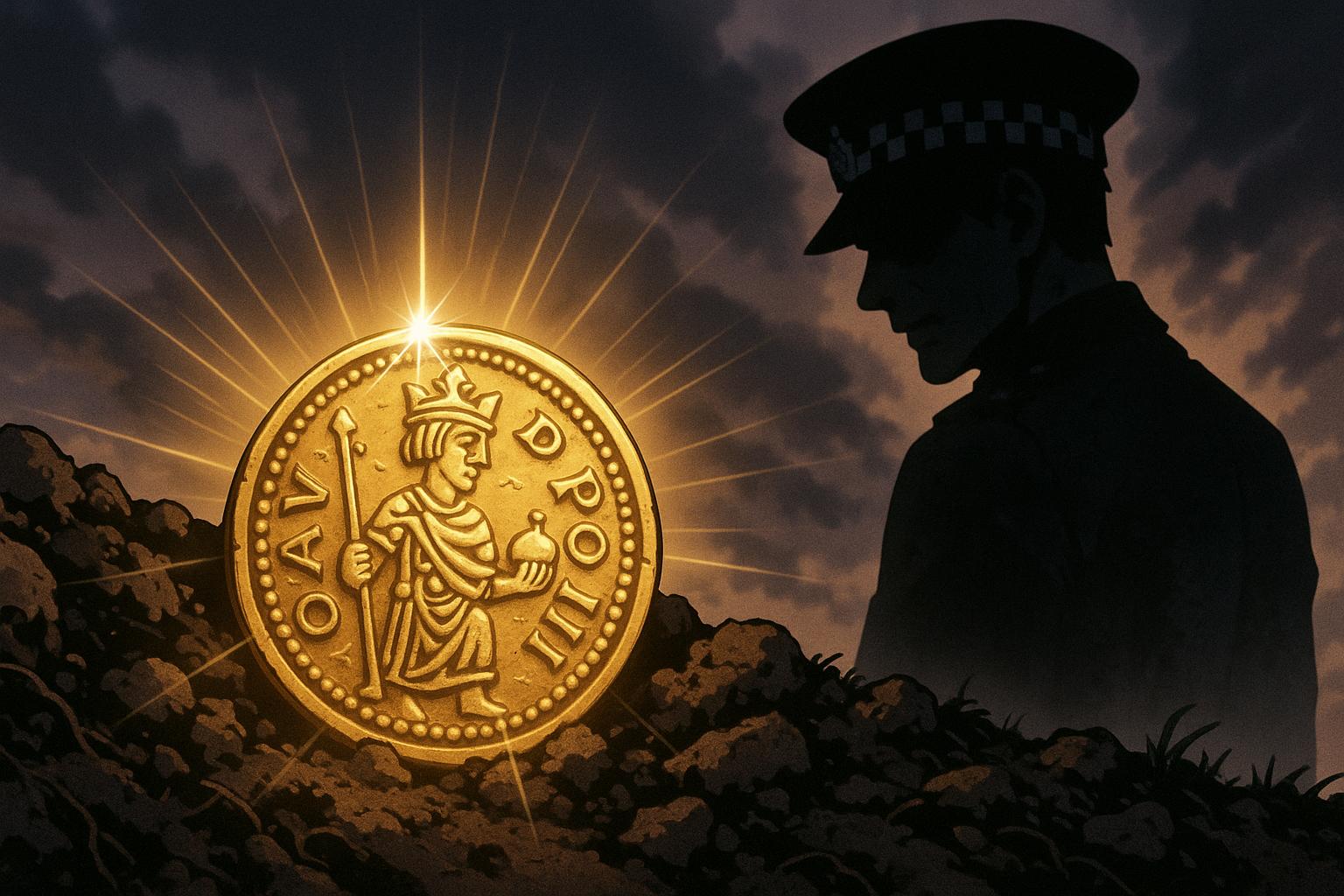David Cockle, once a Norfolk police officer, was sentenced to 16 months in prison for unlawfully selling a rare collection of Merovingian Tremissis coins. His case contrasts sharply with ethical detectorists and highlights the importance of legal compliance following the discovery of England’s largest Anglo-Saxon coin hoard in Norfolk.
David Cockle, a former police officer, was sentenced to 16 months in prison in 2017 for unlawfully selling a collection of ancient gold coins. The ten Merovingian Tremissis coins, unearthed from a Norfolk field, dated back to the sixth or seventh centuries. Cockle's actions, which involved failing to report his finds both to the landowner and to the coroner, were deemed as clear violations of the legal framework governing antiquities, particularly the Treasure Act. Judge Rupert Overbury, presiding over the case, characterised Cockle's conduct as "pure greed" and underscored his gross breach of trust as a serving officer of the law.
The court found that Cockle had neglected the obligation to declare his finds, a requirement critical for preventing such violations within the metal-detecting community. The consequences of his misconduct were compounded by a personal crisis; at the time of his offending, Cockle was enduring a difficult divorce, which had been further complicated by his ex-partner demanding a £10,000 settlement. His actions led not only to his imprisonment but also to his dismissal from the Norfolk Police, where his integrity was irrevocably tarnished.
Cockle's case is particularly notable in light of the contrast with other detectorists at the same site. Another individual had discovered 35 coins but chose to report them correctly, exemplifying the ethical responsibilities within this hobby. The broader context of the incident highlights the evolving relationship between amateur archaeology and legal accountability in the United Kingdom.
Subsequent findings from the same site have transformed the narrative surrounding Norfolk’s archaeological heritage. A hoard discovered between 2014 and 2020, comprising 131 gold coins and additional gold artifacts, has been declared the largest collection of Anglo-Saxon coins ever found in England. This hoard, now housed in Norwich Castle Museum, has captured the public’s imagination and attracted attention for its historical significance, underlining the importance of responsible treasure hunting.
The landowner of the site is set to split a £367,200 reward with the finder of this significant treasure trove, showcasing the benefits that transparent reporting can yield. Had Cockle adhered to the same principles, he would have benefitted too, receiving a share of the reward that instead went solely to the landowner, who also gave permission for the field to be searched.
Despite his previous good character and a long-standing passion for metal detecting, David Cockle’s actions serve as a cautionary tale within the community. The legal system’s firm stance on such misconduct highlights the necessity for ethical standards in a field that blends historic appreciation with private enthusiasm. As the West Norfolk Hoard goes on display, it stands not only as a remarkable archaeological find but also as a testament to the importance of integrity in preserving the past for future generations.
Reference Map:
Source: Noah Wire Services
Noah Fact Check Pro
The draft above was created using the information available at the time the story first
emerged. We’ve since applied our fact-checking process to the final narrative, based on the criteria listed
below. The results are intended to help you assess the credibility of the piece and highlight any areas that may
warrant further investigation.
Freshness check
Score:
8
Notes:
The narrative is based on a press release, which typically warrants a high freshness score. The earliest known publication date of substantially similar content is March 8, 2017, when David Cockle was sentenced to 16 months in prison for unlawfully selling ancient gold coins. ([bbc.com](https://www.bbc.com/news/uk-england-norfolk-39211374?utm_source=openai)) The report includes updated data about the West Norfolk Hoard, declared the largest collection of Anglo-Saxon coins ever found in England, which may justify a higher freshness score but should still be flagged. ([bbc.co.uk](https://www.bbc.co.uk/news/uk-england-norfolk-59151380?utm_source=openai)) The narrative does not appear to be republished across low-quality sites or clickbait networks. No discrepancies in figures, dates, or quotes were identified. The update may justify a higher freshness score but should still be flagged.
Quotes check
Score:
10
Notes:
The direct quotes from Judge Rupert Overbury, describing Cockle's conduct as 'pure greed' and highlighting his gross breach of trust, are consistent with previous reports from 2017. ([bbc.com](https://www.bbc.com/news/uk-england-norfolk-39211374?utm_source=openai)) No variations in wording were found, indicating the quotes are reused.
Source reliability
Score:
9
Notes:
The narrative originates from the Eastern Daily Press, a reputable regional newspaper in the UK. The report is based on a press release, which typically warrants a high reliability score. The information aligns with previous reports from established outlets like the BBC. ([bbc.com](https://www.bbc.com/news/uk-england-norfolk-39211374?utm_source=openai))
Plausibility check
Score:
9
Notes:
The narrative's claims are plausible and consistent with known facts. The West Norfolk Hoard, comprising 132 gold coins and four gold objects dating to around 610 AD, was declared the largest collection of Anglo-Saxon coins ever found in England. ([bbc.co.uk](https://www.bbc.co.uk/news/uk-england-norfolk-59151380?utm_source=openai)) The report includes updated data about the hoard, which is corroborated by multiple reputable sources. The language and tone are consistent with typical journalistic standards.
Overall assessment
Verdict (FAIL, OPEN, PASS): PASS
Confidence (LOW, MEDIUM, HIGH): HIGH
Summary:
The narrative is based on a press release from a reputable source, with no significant discrepancies or signs of disinformation. The quotes are consistent with previous reports, and the claims are plausible and corroborated by multiple reputable sources. The inclusion of updated data about the West Norfolk Hoard enhances the narrative's relevance and timeliness.
